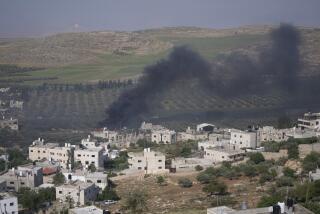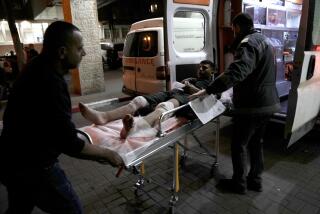2 Israelis die in Tel Aviv, West Bank stabbings; more violence feared
Knife-wielding Palestinian assailants acting hours apart on Monday killed an Israeli soldier in the commercial center of Tel Aviv and a female settler in the West Bank, drawing condemnation from Israeli Prime Minister Benjamin Netanyahu and praise from the militant group Hamas.
Israelis and Palestinians braced for a likely escalation of violence in the wake of the stabbings, the latest in a string of opportunistic attacks in recent weeks by assailants who apparently acted alone.
The episodes point to a deep reservoir of bitterness among Palestinians after the summer’s war in the Gaza Strip, months of street clashes in Jerusalem, tension over a key disputed holy site and a weekend of rioting in Arab towns in Israel, which continued into Monday.
The slain soldier, attacked outside the busy HaHagana train station, was identified by the military as Sgt. Almog Shilony, 20, and officials said the young woman killed about four hours later was Dalia Lamkus, 25, from the settlement of Tekoa, south of Jerusalem.
In a move certain to stoke Israeli fury, Hamas, which rules Gaza, hailed the two attacks, though it stopped short of claiming involvement. “Hamas blesses these heroic acts,” said Sami abu Zuhri, a spokesman for the group. He called for more such assaults.
The growing geographical spread of the violence — hopscotching from northern Israel to coastal, cosmopolitan Tel Aviv to the rocky hills of the West Bank — suggested a broadening of the confrontations that have roiled Jerusalem since July, when a Palestinian teenager was burned alive in an apparent revenge killing after the abduction and slaying of three Israeli seminary students in the West Bank.
Netanyahu cited the widening arc of clashes as an indication that “the terrorism against us knows no borders,” according to the Foreign Ministry.
“It is aimed at all parts of the country for a simple reason: The terrorists and those who incite it want to get rid of us wherever we are,” the Israeli leader told members of his Likud Party.
Israel, which has taken an increasingly hard line against Palestinian unrest, was expected to react to the latest attacks with a heavy hand.
Even before Monday’s stabbings, authorities had carried out mass arrests, proposed prison terms and fines for the parents of rock-throwing youngsters and threatened to revoke the citizenship of Israeli Arabs who took part in anti-Israel demonstrations.
The clashes in northern Israel erupted after police in the town of Kafr Kanna late Friday shot and killed a knife-wielding young man who had battered a police vehicle but appeared to back away when the officers inside emerged, an incident captured in a widely circulated video.
The suspect in the Tel Aviv assault, identified as a teenager from the West Bank town of Nablus, was arrested in a nearby building shortly after the soldier’s stabbing. Palestinian news reports put his age at 17, but the Israeli military said he was 18.
In the second stabbing, outside the Alon Shvut settlement, the attacker was shot and seriously wounded by a security guard, according to Israeli news reports. Palestinian officials said he was a 25-year-old from the West Bank town of Hebron.
Israelis were rattled by the fact that individuals were singled out for attack. Public anger focused on the government and security forces. Visiting the scene of the Tel Aviv stabbing, the minister for public security, Yitzhak Aharonowitz, was heckled by angry onlookers who shouted, “Where’s the security?”
Police and witnesses said the assailant lunged at the uniformed soldier, stabbing him repeatedly. Passersby intervened, interrupting the attack, which left the victim bleeding heavily on the ground.
The soldier was taken to a hospital, where he died hours later. The Palestinian news agency Maan quoted the parents of the suspect, Nur al-Din abu Hashieh, as saying he had entered Israel illegally looking for work.
Tel Aviv police commander Benzi Sau, speaking to journalists at the scene of the attack, suggested that greater carnage might have been averted, because a preliminary investigation indicated the assailant had tried to grab the soldier’s weapon. In Israel, soldiers carry their guns while traveling home or to rejoin their units.
The two deadly attacks created a political opening for Netanyahu’s more hawkish foes. Lawmaker Danny Danon, who earlier Monday had announced he would challenge the prime minister for the chairmanship of Likud, was quoted by news media as urging Netanyahu and his top security officials to “stop talking and start acting.”
Opposition leader Isaac Herzog also faulted the government response, saying heightened security measures must be coupled with “creating a diplomatic dialogue channel.” President Reuven Rivlin, who has been known for his conciliatory gestures, offered condolences to the victims, called for national unity and said the security forces “will not rest until they return normality to our daily lives.”
The West Bank attack had echoes of the June abduction and killing of the three yeshiva students, which helped spark the 50-day war between Israel and Hamas in the Gaza Strip. It took place at the same bus and hitchhiking stop where the students were seized.
Israeli news media said the assailant, who had served jail time for hurling a firebomb at Israeli troops, initially tried to ram his car into those waiting at the stop, but struck a stone wall instead. Similar attacks by Palestinian drivers have killed four people since Oct. 22.
After hitting the wall, the attacker jumped from his car, fatally stabbed the young woman and wounded two other people, witnesses said. A guard at the settlement gate, alerted by their cries for help, shot the assailant.
Twitter: @laurakingLAT
Sobelman is a special correspondent. Special correspondent Maher Abukhater in Ramallah, West Bank, contributed to this report.
More to Read
Start your day right
Sign up for Essential California for news, features and recommendations from the L.A. Times and beyond in your inbox six days a week.
You may occasionally receive promotional content from the Los Angeles Times.






